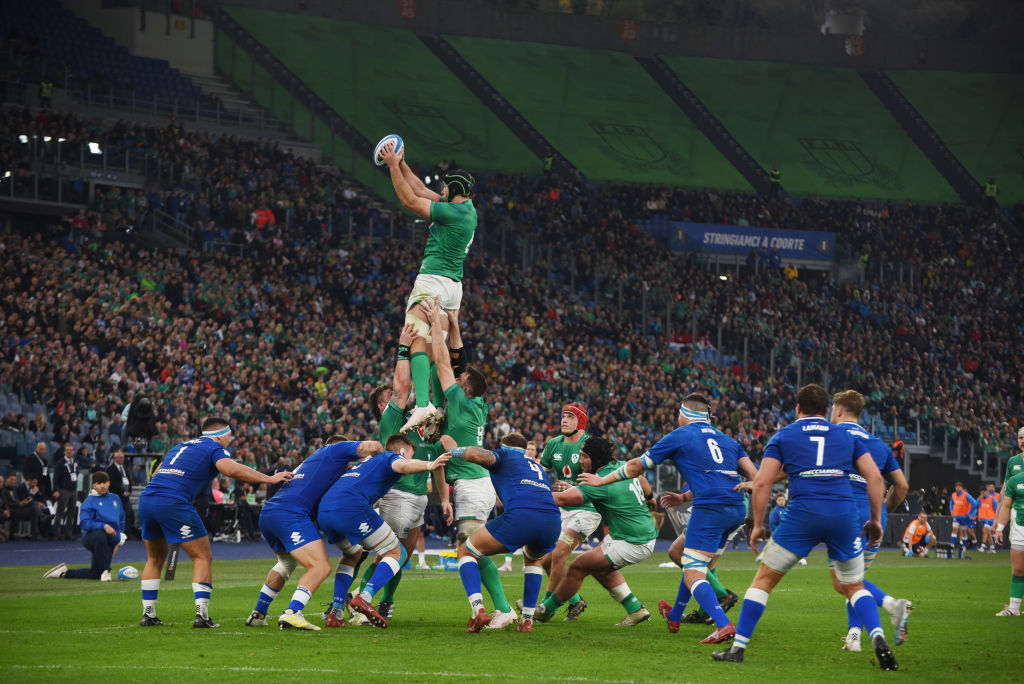Ireland defeated Italy, 34-20, on Saturday in Rome in the third round of the 2023 Six Nations championship. The win keeps Ireland undefeated in this year’s rendition of the annual rugby tournament and still in the running for a Grand Slam, an unofficial honor conferred upon a team that beats all five of its rivals in the same round-robin competition.
Ireland’s boffo performance thus far isn’t surprising to rugby fans: Ireland entered the tournament as the top-ranked rugby team in the world. But, to non-followers, there’s plenty of oddness about that ranking. Not only because Ireland is so small; the most recent census put the population at 5.1 million, its highest since the census of 1841 (or before the Great Famine) but still tinier than any of the planet’s other top rugby nations. But what really makes Ireland’s standing atop the rugby universe difficult to grasp is the country’s historically antagonistic relationship with the sport.
All this goes back to the Gaelic Athletic Association, a group whose only rival as the most powerful influence on Irish culture is the Catholic Church. The GAA was founded in 1884 by Irishmen who hoped to use indigenous pastimes to maintain an Irish identity apart from that of the British occupiers. Rugby, a game which was allegedly born in the English town of Rugby, was spreading in Ireland at the time the GAA came about. The Dublin University Football Club had formed at Trinity College in the Irish capital city in the mid-1850s, and is now considered the oldest rugby organization in the world. And beginning in 1883, an Irish team began participating in the new Home Nations Championship, regarded as the first international rugby competition. This forefather of the Six Nations event was initially open only to countries of the United Kingdom–England, Scotland, Wales and, via imperialist means, Ireland. France and Italy signed on through the years to make it six teams.
Hurling and Gaelic football, sports with purely Irish roots, were sanctioned and promoted by the GAA. Rugby was seen by the Irish organization as an invasive non-native species of a sport and treated accordingly. Around the turn of the last century, the GAA decision makers promulgated Rule 27, a bylaw formally prohibiting members from playing “foreign” sports, including rugby, soccer and cricket. Noted Irish rebel leader Michael Collins railed against what he called the “Garrison games” that the oppressors brought to Ireland. Historians quote Collins, an occasional hurler who did a stint as a GAA administrator while plotting to rid his homeland of all things British, as saying participation in such endeavors helped the “peaceful penetration” of Ireland by the invaders. Rule 27 was in place until 1971.
Also around the turn of the century the organization implemented what would become known as Rule 42, prohibiting non-Gaelic games from taking place on all athletic grounds run by the GAA. This edict had longer legs than Rule 27: It was loosened in 2005, when Lansdowne Road, a Dublin stadium owned by the Irish Rugby Football Union and the home grounds for the Irish national rugby and soccer teams, began planning renovations. So the GAA said decisions to permit non-Gaelic games at its venues during construction would be made on a case-by-case basis.
The GAA’s historically chilly relationship with rugby became a national and even international issue in 2007, in the run-up to that year’s Six Nations Tournament. The Lansdowne Road reconstruction had begun and left the stadium unavailable. Croke Park, the GAA-owned 80,000-seat stadium in Dublin, was the only other venue in the country big enough to seat the crowds the Six Nations games would draw. But Croke Park, which opened in 1891 shortly after the GAA's founding, is more than just another arena in Ireland. It was also the site of the Bloody Sunday massacre: On Nov. 21, 1920, British troops showed up during a Gaelic football match and opened fire on fans and players. A section of the stadium is still named after Michael “Mick” Hogan, a Tipperary footballer who was gunned down on the Croke Park pitch that day. England was scheduled to visit Ireland for that year’s Six Nations.
If the garrison games ban stayed in place, the Irish squad would have to play all its Six Nations matches on the road that year. So the GAA relented. Then the debate turned to whether the playing of “God Save the Queen,” the anthem of the British Empire, would be allowed inside Croker. Eventually, the GAA realized that if they were going to host an international match, they’d have to let the anthems be played, even the anthem of the perpetrators of a historic atrocity on the very grounds where the atrocity took place. All the rancor went away during the Ireland-England pregame, as the songs were played without disruption. Dublin police officer Pat Kenny, longtime conductor for the An Garda Síochána band, the house band of Croke Park, told me in 2019 that the playing of the anthems gave him “the proudest moment” of his decades-long orchestral career.
“Everybody was listening,” Kenny said. “You could hear a pin drop in that stadium. It was a great day.”
The bandleader admitted that day’s greatness was abetted by the fact that when the music stopped Ireland went on to crush England, 43-13, the worst defeat suffered by the English side in the history of the Six Nations championship.
England is coming to Dublin again to play rugby. On March 18, Aviva Stadium, as the renovated Lansdowne Road venue is now known, will host the last match of the 2023 Six Nations championship. The event will be huge: The Irish Times reported that some ticket sellers were asking for more than 3,000 Euros (around $3,163). To honor the invaders, for the first time in 70 years, “God Save the King” will be played before kickoff. Nobody in Ireland seems to care about the song. But there’s still time.






